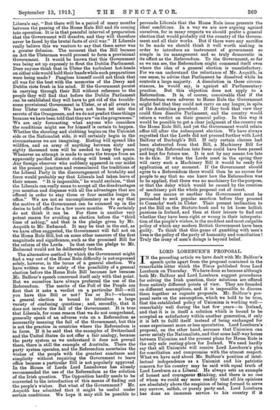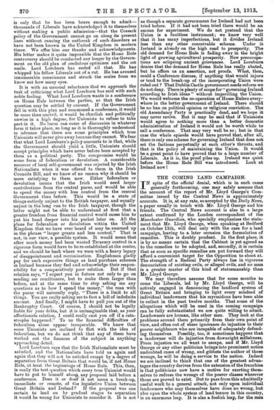LORD LOREBURN'S PROPOSAL.
IN the preceding article we have dealt with Mr. Balfour's speech quite apart from the proposal contained in the remarkable letter which the Times published from Lord Loreburn on Thursday. We have done so because although both Mr. Balfour and Lord Loreburn suggest procedures for solving the Irish question, their solutions are offered from entirely different points of view. They are founded on different assumptions, and it is impossible to discuss them together as cognate proposals. Mr. Balfour's pro- posal rests on the assumption, which we hold to be true, that the established policy of Unionism is working well— remarkably well during the last few years—in Ireland, and that it is in itself a solution which is bound to be accepted as satisfactory within another generation, if only it is left to fulfil itself instead of being exchanged for some experiment more or less speculative. Lord Loreburn's proposal, on the other hand, assumes that Unionism can never satisfy the Nationalists, and that some half-way house between Unionism and the present plans for Home Rule is the only safe resting-place for Ireland. We need hardly say that all Unionists will receive Lord Loreburn's plea for conciliation and compromise with the utmost respect. What we have said about Mr. Balfour's position of intel- lectual independence as a Unionist and his patriotic concern for his country may be said with equal truth of Lord Loreburn as a Liberal. He always sets an example of honest and courageous thinking, and there is no one of whom we could say more readily that all his opinions are absolutely above the suspicion of being formed to serve any narrow, selfish, or purely party end. Lord Loreburn has done an immense service to his country if it
is only that he has been brave enough to admit— thousands of Liberals have acknowledged it to themselves
without making a public admission—that the Cossack
policy of the Government cannot go on along its present lines without causing the outbreak of such disorders as have not been known in the United Kingdom in modern times. We offer him our thanks and acknowledgments. His letter makes it quite impossible that the Home Rule controversy should be conducted any longer by the Govern- ment on the old plan of credulous optimism and the set smile. Lord Loreburn has ended all that. He has whipped his fellow Liberals out of a rut. He has aroused innumerable consciences and struck the scales from we know not how many eyes.
It is with an unusual reluctance that we approach the task of criticising what Lord Loreburn has said with such noble feeling. What Lord Loreburn wants is a conference on Home Rule between the parties, so that the Irish question may be settled by consent. If the Government fell in with this plan and summoned a conference, it would be more than uncivil, it would be churlish and politically unwise in a high degree, for Unionists to refuse to take part in it. No harm can come of discussion in whatever form it takes place, so long as it is thoroughly understood in advance that there are some principles which true Unionists will never give away because they cannot. We fear that what Lord Lorelurn's policy amounts to is that, while the Government should yield a little, Unionists should accept principles which have never before been accepted by them as a political party. The compromise would be some form of federalism or devolution. A considerable measure of local self-government was rejected by the Irish Nationalists when it was offered to them in the Irish Councils Bill, and we know of no reason why it should be more satisfying to them now. Either federalism or devolution means that the Irish would need larger contributions from the central purse, and would be able to spend the money with less control from the central Government than before. This would be a state of things entirely unjust to the British taxpayer, and equally unjust in the long run to the Irish taxpayer, though the latter might not be able to understand at first that a greater freedom from financial control would cause him to 0 put his hand deeper into his pocket later on. All the plans for federalism or devolution within the United Kingdom that we have ever heard of may be summed up in the phrase "larger grants and less control." That is not, in our view, a possible system. It would mean that after much money had been wasted Treasury control in a rigorous form would have to be re-established at the centre, and we should be back where we were with a heavy legacy of disappointment and recrimination. Englishmen gladly pay for such expensive things as land purchase schemes in Ireland because they feel and acknowledge their respon- sibility for a comparatively poor relation. But if that relation says, "I expect you in future not only to go on sending me remittances, but to make them larger than before, and at the same time to stop asking me any questions as to how I spend the money," the man with the purse will naturally reply, "There is a limit to all things. You are really asking me to foot a bill of indefinite amount. And finally, I might have to pull you out of the Bankruptcy Court. Of course, I should not be legally liable for your debts, but it is unimaginable that, as your affectionate relation, I could really cast you off if a cata- strophe happened." To us the financial difficulties of federalism alone appear insuperable. We know that some Unionists are inclined to flirt with the idea of federalism, but we do not think that any of them have worked out the finances of the subject in anything approaching detail.
Lord Loreburn says that the Irish Nationalists must be satisfied, and the Nationalists have told us again and again that they will not be satisfied except by a degree of separation from Great Britain that would be, if not Home Rule, at least the beginnings of Home Rule. This, then, is really the test question which every true Unionist would have to put to himself aboutt any proposal laid before a conference. Does it or does it not mean a break-up, immediate or remote, of the legislative Union between Great Britain and Ireland ? If the proposal was one certain to lead on by gradual stages to separation it would be wrong for Unionists to consider it. It is not as though a separate government for Ireland had not been tried before. If it had not been tried there would be an excuse for experiment. We do not pretend that the Union is a faultless instrument; we know very well that it has many imperfections, but it divides Ireland less than any other conceivable scheme. Under it Ireland is already on the high road to prosperity. The old demand for Home Rule is fading away in the bright light of growing agricultural prosperity. New preoccupa- tions are eclipsing ancient grievances. Lord Loreburn denies that the demand for Home Rule has really abated, but he offers us an assertion, not proofs. What, then, could a Conference discuss, if anything that would injure or tend to the break-up of the incorporating Union were ruled out ? That Dublin Castle government needs reform we do not deny. There is plenty of scope for" governing Ireland. according to Irish ideas" without imperilling the Union. We would welcome the co-operation of Home Rulers every- where in the better government of Ireland. There should be no ban on political opinion or religious conviction. The old Ascendancy Party is practically dead, and we hope it may never revive. But it may be said that if Unionists would agree to nothing more than a better domestic administration of Ireland it would not be worth while to call a conference. That may very well be so ; but in that case the whole episode would have proved that, after all, there is only one scheme for governing Ireland that does not set the factions perpetually at each other's throats, and. that is the policy of maintaining the Union. It would be a great point to have proved that to a large number of Liberals. As it is, the proof piles up. Ireland was quiet before the Home Rule Bill was introduced. Look at Ireland now !











































 Previous page
Previous page